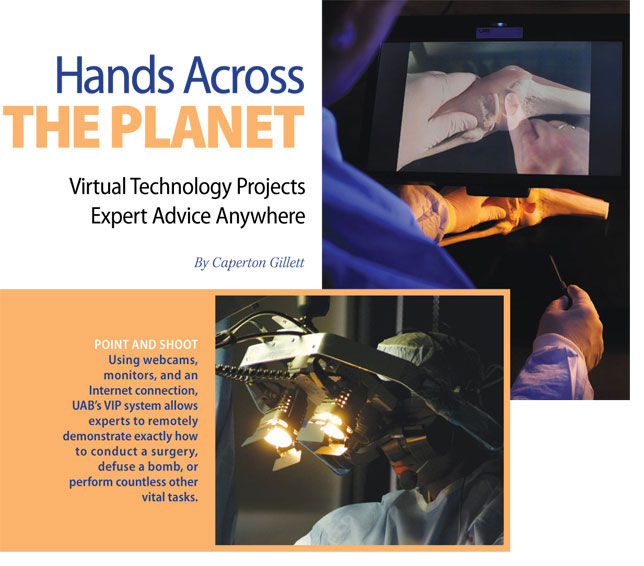
|
A patient is on the operating table in Boston. The top expert on his condition is hundreds of miles away in Birmingham. If only that expert could zap her expertise across the Internet to the surgeon’s hands. The Virtual Interactive Presence (VIP) system, created through a collaboration of the UAB School of Engineering and the UAB School of Medicine, makes that possible. Units on each end consist of a stereoscopic camera and goggles or a monitor; on screen, a less-experienced surgeon can see an expert’s hands “ghosted” over his own, showing him exactly what to do. VIP is the brainchild of UAB neurosurgeon Barton Guthrie, M.D., who was looking for a way to export UAB’s medical expertise from Birmingham to locations around the world. He found his answer in the School of Engineering’s Enabling Technology Lab. “Much of what is needed for a connection—Internet access, monitors, and Web cameras—will be present and available wherever it’s needed,” Guthrie says. “What the virtual technology provides is a way to bring it all together to allow the remote presence of an expert.” There is plenty of potential for VIP outside the operating room, as well. NASA, the Department of Defense, and the Department of Homeland Security have shown interest in the technology for applications ranging from aircraft maintenance to bomb disposal. “Right now, we’re talking with NASA about deploying this technology to the International Space Station,” says Alan Shih, Ph.D., director of the Enabling Technology Lab. “A scientist on the ground could guide an astronaut in space to repair equipment or perform experiments.” The VIP development team continues to refine the system and explore the boundaries between possibility and science fiction. “That’s how this technology keeps evolving,” Shih says. “We’re glad now that it’s come to a stage where it can be applied to many fields.” Alan Shih, director of the UAB School of Engineering's Enabling Technology Lab, demonstrates the capabilities of the VIP device in this video. |